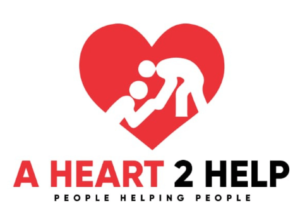Elderly community support is vital for maintaining the quality of life and independence of our senior population. As our society ages, the need for comprehensive services and resources tailored to older adults grows increasingly important.
At A Heart 2 Help, we understand the challenges faced by seniors and their families in navigating the complex landscape of available support. This guide will explore the essential services, social resources, and financial assistance programs designed to enhance the lives of our elderly community members.
Essential Services for Seniors: What’s Available?
Home Care: A Cornerstone of Senior Support
Home care services form a critical component of senior support. These programs offer assistance with daily tasks, ranging from personal care to light housekeeping. Around 12 million people in the U.S. receive home care, with diverse long-term care costs in different states. This support enables seniors to maintain their independence while receiving necessary help.
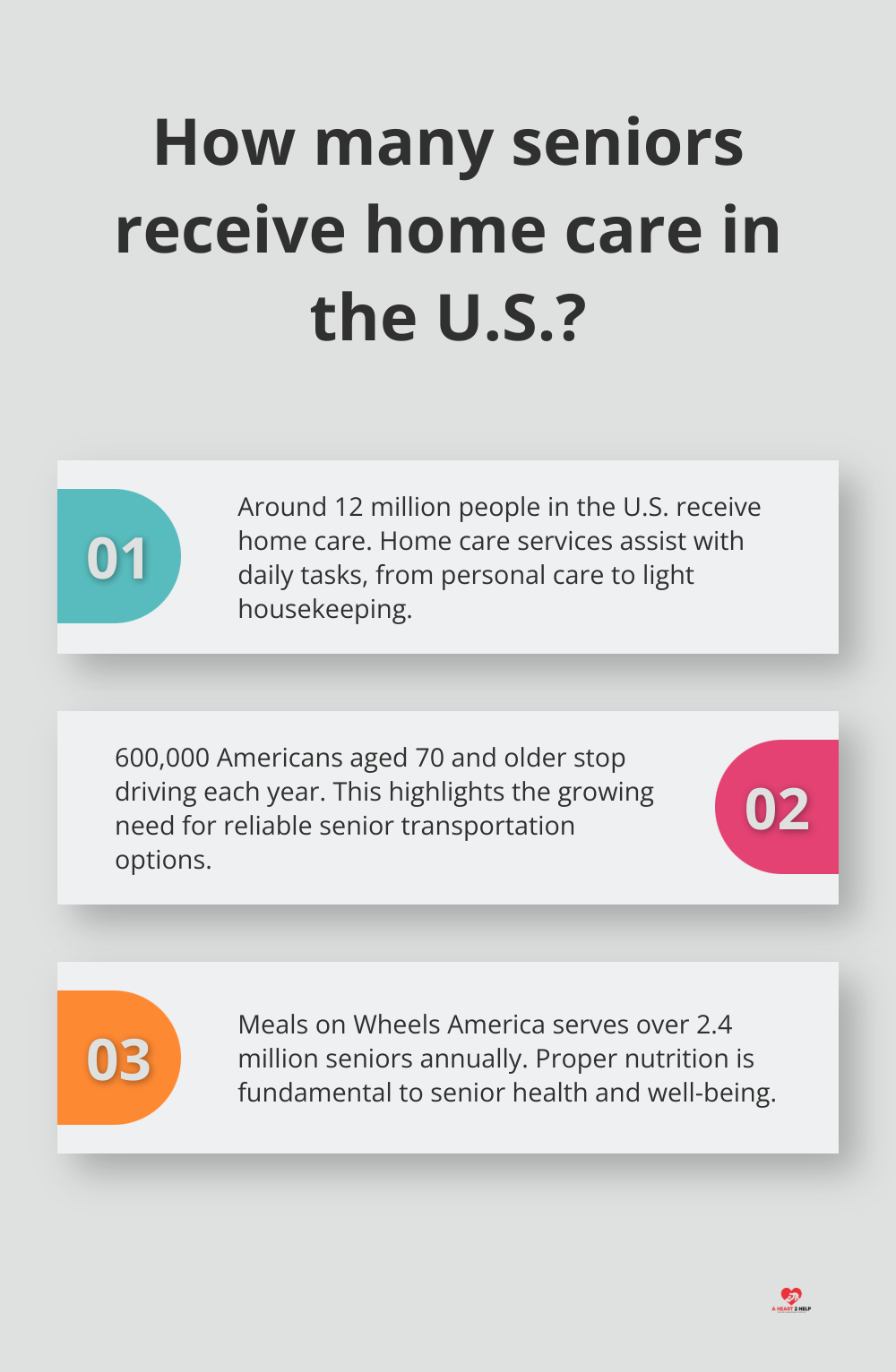
When selecting home care, it’s important to consider agencies that provide a spectrum of services. Some offer skilled nursing care, while others concentrate on non-medical assistance. Assessing individual needs and finding a provider with personalized care plans is key to ensuring optimal support.
Transportation: Keeping Seniors Mobile
Mobility equals freedom, and transportation services are essential for seniors who no longer drive. The National Aging and Disability Transportation Center states that 600,000 Americans aged 70 and older stop driving each year. This statistic underscores the growing demand for reliable senior transportation options.
Many communities provide specialized transit services for older adults. These often include door-to-door pick-ups, wheelchair-accessible vehicles, and reduced fares. Local Area Agencies on Aging typically have information on available transportation programs in specific regions.
Meal Programs: Nourishing Body and Soul
Proper nutrition is fundamental to senior health. Meal delivery services such as Meals on Wheels provide more than just food – they offer a connection to the outside world. Meals on Wheels America serves over 2.4 million seniors annually, illustrating the widespread impact of these programs.
For seniors able to leave home, congregate meal sites offer both nutrition and socialization opportunities. These programs, frequently held at senior centers or community halls, provide balanced meals and a chance to interact with peers.
Medical Alert Systems: Ensuring Safety
Medical alert systems provide peace of mind for seniors living alone and their families. These devices allow users to quickly call for help in case of falls or other emergencies. The Centers for Disease Control and Prevention (CDC) reports that one in four Americans aged 65+ falls each year, highlighting the importance of such safety measures.
When choosing a medical alert system, it’s crucial to consider factors like range, water resistance, and functionality outside the home. Some advanced systems (such as those with fall detection technology) automatically alert emergency services if a fall occurs.
Community Support: The Role of Volunteers
Volunteers play a vital role in supporting seniors within their communities. They can assist with tasks ranging from grocery shopping to companionship. Organizations that connect volunteers with seniors help bridge the gap between those who need assistance and those willing to provide it.
These essential services form the foundation of senior support, but they represent just the beginning. The next section will explore social and recreational resources that further enhance the lives of older adults in our communities.
Community support comes in various forms, including emotional support through support groups, counseling services, and informal networks of friends and neighbors.
Enriching Senior Lives Through Social Engagement
The Power of Senior Centers
Senior centers serve as vital hubs for older adults, offering a wide range of activities and resources. These centers provide diverse programs, from arts and crafts to technology classes, which help seniors stay connected with their communities.
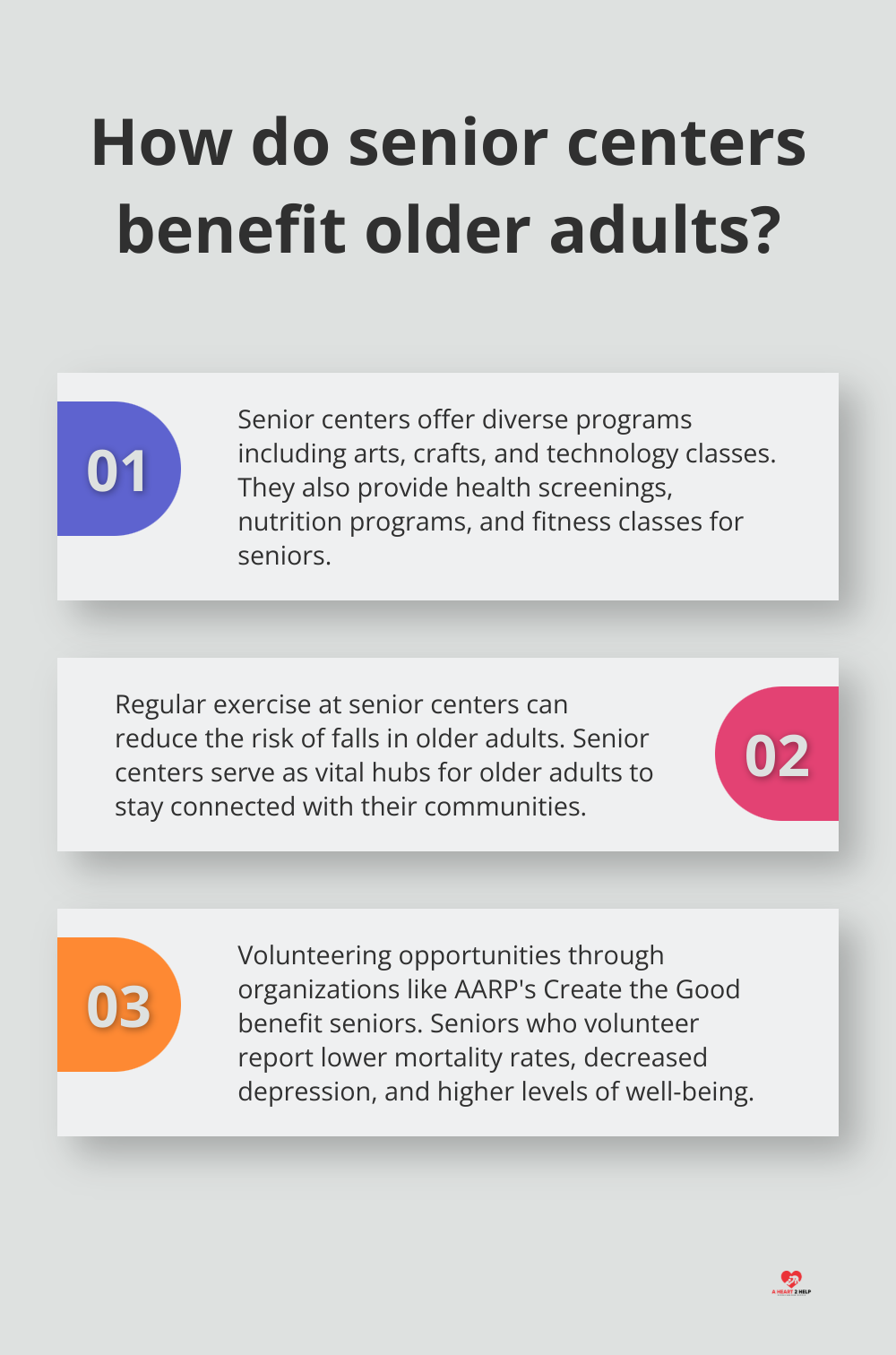
Many senior centers also offer health screenings, nutrition programs, and fitness classes. Regular exercise can reduce the risk of falls in older adults. This underscores the importance of fitness programs tailored for seniors.
Volunteering: A Reciprocal Support System
Volunteering allows seniors to contribute to their communities while reaping personal benefits. A study by the Corporation for National and Community Service found that seniors who volunteer report lower mortality rates, decreased depression, and higher levels of well-being compared to non-volunteers.
Organizations like AARP’s Create the Good and VolunteerMatch connect seniors with opportunities that match their skills and interests. These platforms offer various options (from mentoring youth to helping at local food banks), which enable seniors to remain active and contribute meaningfully to society.
Lifelong Learning: Maintaining Mental Acuity
Educational programs for seniors have gained popularity in recent years. Many universities now offer programs designed specifically for older adults. The Osher Lifelong Learning Institutes, available at 124 universities across the United States, provide non-credit educational programs for adults aged 50 and older.
These programs cover a wide range of topics, including history, literature, technology, and current events. Participation in lifelong learning not only keeps the mind active but also provides opportunities for social interaction. A study published in the International Journal of Lifelong Education associated participation in such programs with improved cognitive function and overall life satisfaction among older adults.
Exercise and Fitness: Tailored for Seniors
Physical activity plays a critical role in maintaining health and independence for older adults. Many communities offer fitness classes specifically designed for seniors, such as low-impact aerobics, water aerobics, and chair yoga. These classes not only improve physical health but also provide opportunities for social interaction.
The Centers for Disease Control and Prevention recommends that older adults engage in at least 150 minutes of moderate-intensity aerobic activity (or 75 minutes of vigorous-intensity aerobic activity) every week. Regular exercise can help seniors maintain muscle strength, balance, and flexibility, which are essential for preventing falls and maintaining independence.
As we transition to the next section, we’ll explore the financial and legal resources available to support seniors in managing their affairs and planning for the future. These resources complement the social and recreational activities, forming a comprehensive support system for our elderly community members.
Navigating Financial and Legal Support for Seniors
Understanding Medicare and Medicaid
Medicare and Medicaid provide essential healthcare coverage for seniors. Medicare, primarily for those 65 and older, covers various medical services. However, it has limitations. For example, Medicare doesn’t cover long-term care, which surprises many seniors. The Medicare Rights Center reports that in 2020, only 18% of Medicare beneficiaries had coverage that included long-term care services.
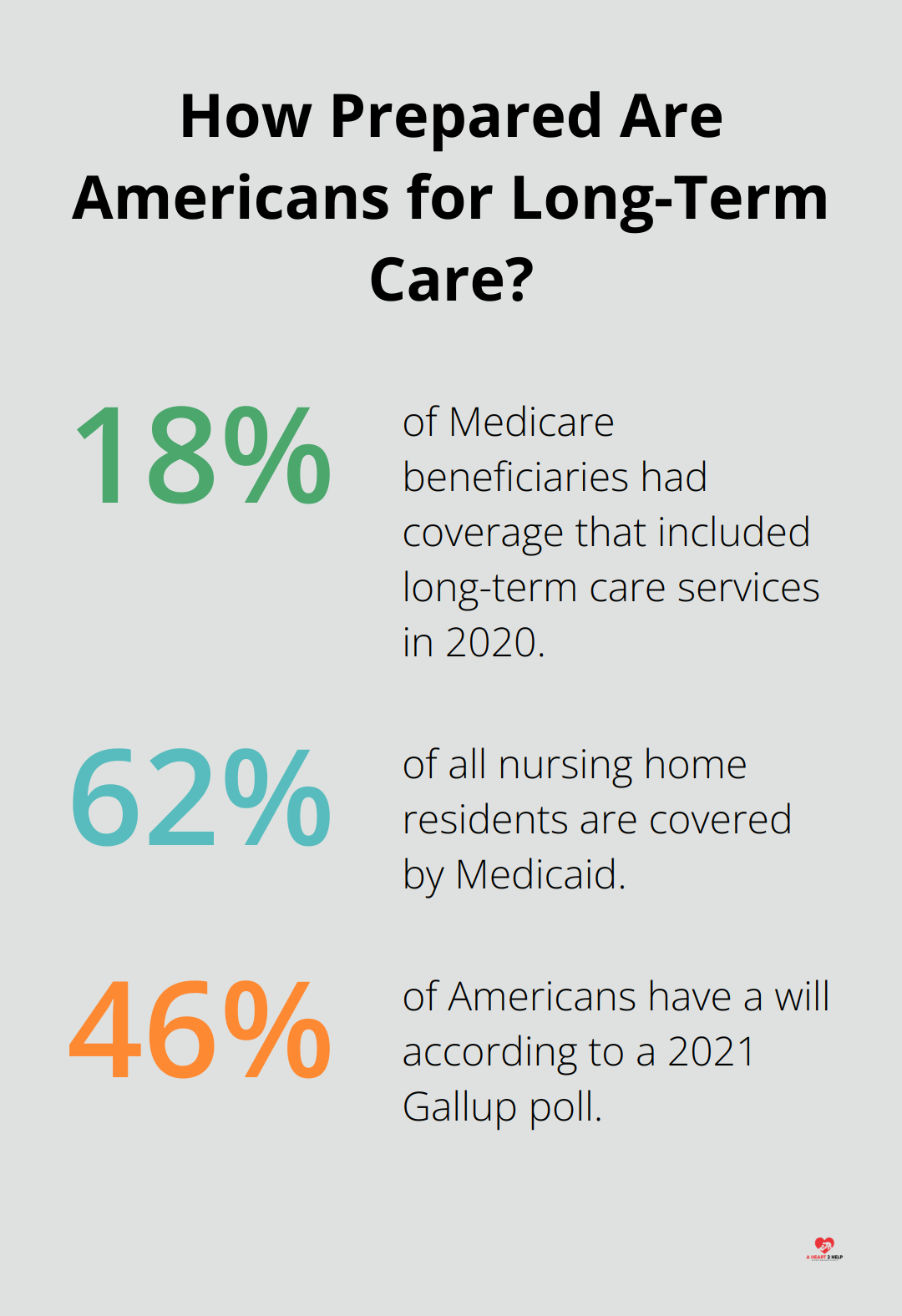
Medicaid can cover long-term care costs for eligible low-income seniors. The Kaiser Family Foundation notes that Medicaid covers 62% of all nursing home residents. Understanding how these programs work together is important for comprehensive healthcare coverage.
Maximizing Social Security Benefits
Social Security forms a cornerstone of retirement income for many seniors. The timing of when to start claiming benefits can significantly impact the amount received. The Social Security Administration reports that the estimated average monthly benefit for retired workers in 2023 is $1,827. This amount varies greatly depending on individual circumstances.
A key decision is when to start claiming benefits. While seniors can claim benefits as early as age 62, waiting until full retirement age (66-67 for most current retirees) or even up to age 70 can substantially increase monthly payments. The difference can be significant – delaying from 62 to 70 can increase your benefit by up to 77%.
Securing Your Future with Estate Planning
Estate planning protects assets and ensures respect for your wishes. It can provide peace of mind, prevent confusion and reduce family disputes. Yet, according to a 2021 Gallup poll, only 46% of Americans have a will. This lack of preparation can lead to complications for families and potential mismanagement of assets.
Legal aid services specifically for seniors can prove invaluable in this process. Organizations like the National Academy of Elder Law Attorneys provide resources and can connect seniors with specialized attorneys. These professionals can assist with creating wills, setting up trusts, and establishing powers of attorney (all critical components of a comprehensive estate plan).
Managing Finances in Later Life
Financial management becomes increasingly important as we age. The Consumer Financial Protection Bureau offers free resources specifically designed for older adults, including guides on avoiding scams and managing someone else’s money.
For those who need more hands-on assistance, financial planning services tailored for seniors can help. These services range from basic budgeting advice to comprehensive retirement planning. The National Association of Personal Financial Advisors can serve as a good starting point for finding a fee-only financial planner who specializes in retirement planning.
Final Thoughts
A wealth of services and resources support our elderly community members. These resources enhance the quality of life for seniors and foster a sense of belonging and purpose. Elderly community support addresses diverse needs, combats social isolation, promotes well-being, and provides practical assistance for daily living.
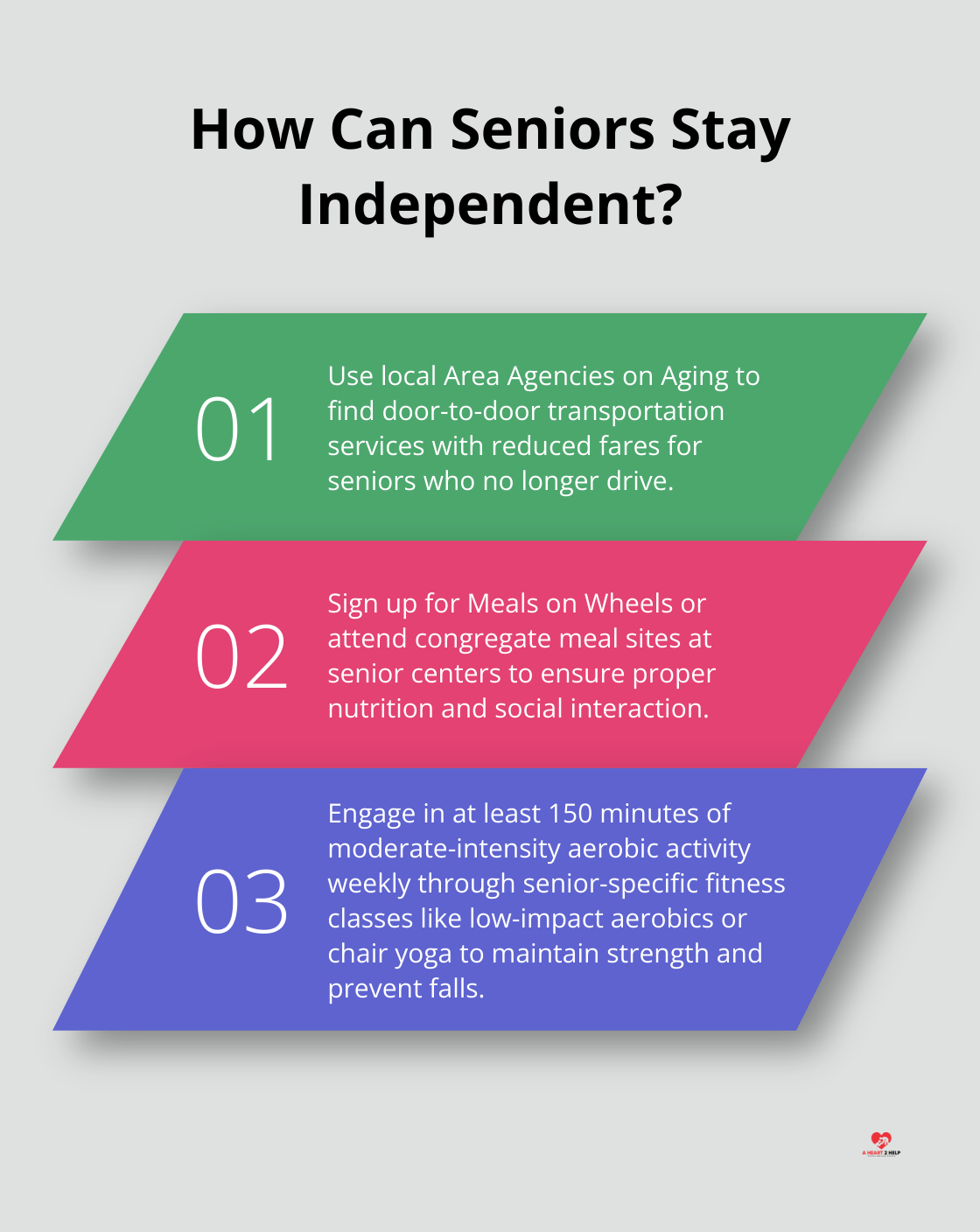
We at A Heart 2 Help understand the challenges of navigating the complex landscape of senior services. Our innovative care-app connects those in need with compassionate volunteers, making it easier to access support. The platform empowers individuals to offer help on their own schedules, encouraging acts of kindness throughout the community.
The strength of our communities lies in our ability to support one another. We can ensure that our elderly community members receive the care, respect, and support they deserve. A society where aging is celebrated and supported is within reach through the use of available resources and innovative solutions.
